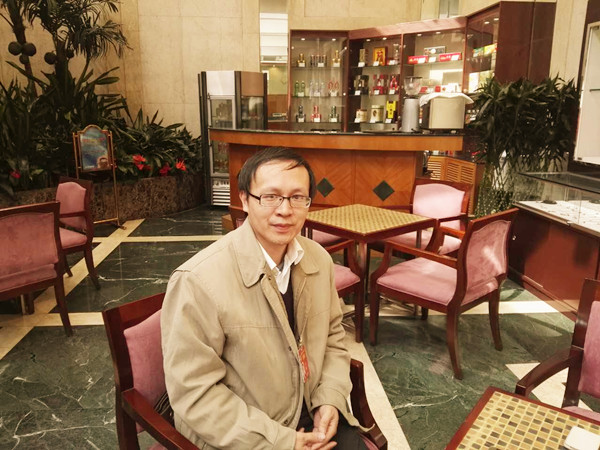原文标题:prioritize technical and vocational training for poverty relief
原文链接:http://m.chinadaily.com.cn/en/2017-03/14/content_28552473.htm?from=singlemessage&winzoom=1

Li Jian, a member of the National Committee of the Chinese People's Political Consultative Conference and dean of the School of Humanities and Social Sciences of the Beijing Institute of Technology. [Photo/chinadaily.com.cn]
全国政协委员、北京理工大学人文与社会科学学院院长李健教授接受中国日报网采访。
"Poverty can be reduced through educationand knowledge and skills can help lessen the burden of poverty," said Li Jian, a member of the National Committee of the Chinese People's Political Consultative Conference (CPPCC) and dean of the School of Humanities and Social Sciences of the Beijing Institute of Technology, sharing his ideas on targeted poverty alleviation, a hot issue at this year's meeting.
"People sometimes misunderstand the meaning of targeted poverty relief, assuming that helping the targeted group increase its income in the short term, or directly allocating poverty alleviation funds can help them out of poverty, while neglecting the fundamental thing which should be education," commented Li in his interview with chinadaily.com.cn on March 11.
He emphasized that targeted poverty relief must be comprehensive, scientific, highly efficient and continuous, and he suggested that vocational education should be a top priority.
People who have passed school age could receive training to gain basic knowledge and skills in either farming or industrial work,helping them make a good living by their own hands.
"This is the most practical way and can also solve the generation-to-generation problem in poverty," he said.
Li has been keeping a close eye on the implementation of the national policy prioritizing high school students from China's western regions and ethnic regions as college and university candidates, saying that "although this policy is designed out of good will and intends to narrow the gap between east and west China, it is sometimes carried out improperly.
"For example, some students from these places who have been given priority for entering college or university may not fully meet the knowledge requirements for their major,and thus may find it difficult to catch up with their classmates," Li said, "and some others may find what they have learned in their major to be useless for their hometown's economic development when they return."
Li suggested that to solve this problem government or educational institutions should offer guidance to such students to help them choose suitable majors, universities and colleges.
日前,针对教育扶贫问题,全国政协委员、北京理工大学人文与社会科学学院院长李健教授认为,教育扶贫,一定要围绕贫困地区最亟待解决的问题,精准发力,扶到根上。
“扶贫一直以来都是社会各界关注的问题,但是很多扶贫还是停留在短期工作上,例如给贫困人员安排工作、提供生活补助等等,但这些都不能从根本上解困贫困问题”,李健委员说道。
谈及脱贫难问题,李委员认为,除了一定的客观环境等因素,一些贫困者难以脱贫的根本原因在于其知识文化水平太低,自身没有“造血功能”,拔掉贫穷病根最关键在于教育。
李委员继续说道,他所说的教育是广义的教育,既包括小初中高基础教育的普及、大学招生适当的政策倾斜、国家在资金和师资等方面的支持,也包括针对贫困者开展的技能培训和职业培训。
“具体说来,我建议在贫困地区开展各式各样、结合当地特点的培训教育,普及一般文化知识和农业技能,教会他们如何科学农业生产”,李委员说。
这是他对自己的家乡进行了调研之后的有感而发。“同一个村,同样的自然环境、同样的土壤、同样的一批种子,农民种植的水果产量却有多有少、质量天壤之别”,他认为农民是否会科学种植起了决定性的作用。
“这种方式的教育扶贫也有助于阻断贫困的代际传播,使彻底脱贫成为现实”,李委员补充道。
谈到目前国家对贫困地区的高考招生倾斜政策,李委员认为,这是一项重要的教育扶贫举措,但是这一政策在推行过程中还是存在一些不科学的地方。
他认为,经济水平的落后和教育资源的相对匮乏,导致来自相对贫困地区的高中毕业生多数在知识结构和积累上并不能真正达到高校课程的要求,导致一部分人来到大学之后“学习跟不上”,还有一些学生,由于所报专业并不贴合当地经济所需,未能“反哺家乡”反倒面临“毕业即失业”的问题。
针对这些现象,李委员建议政府和学校加强对这些学生专业选择指导,选专业时不能“选太偏”,而应选择其家乡发展所需的专业门类,便于其毕业后反哺家乡。同时,选学校不能“拔太高”,要量力而行,保证学生能“跟得上”、“学得好”,真正做到有效扶贫。
(策划、审核:李冰)